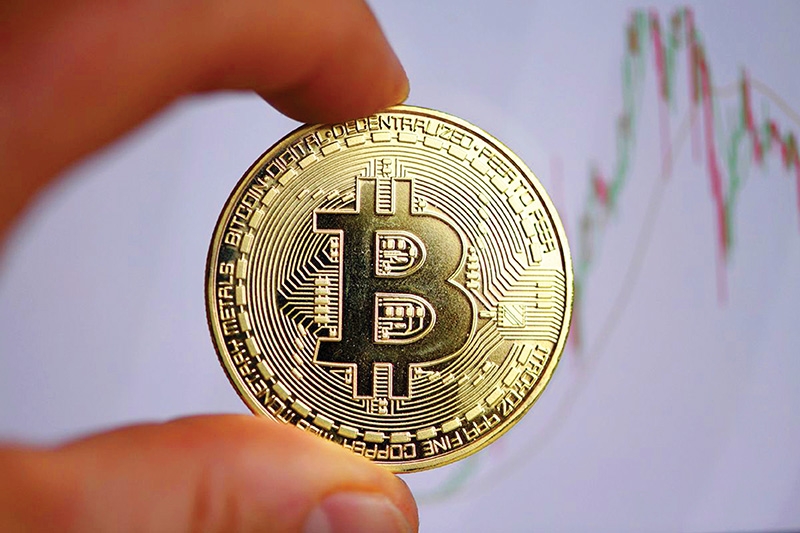Interest ramps up in cryptocurrencies
 |
| By Prof. Dr. Andreas Stoffers - Country director, Friedrich Naumann Foundation Vietnam |
Remittances, which are made by many Vietnamese abroad, are likely to play a significant role in this. But the gigantic profits that have been made with cryptocurrencies in the last 12 months are also likely to attract more and more Vietnamese investors and “amateur investors”. People do not want to miss out on getting rich. But is it really that simple? And what is the legal situation in Vietnam?
The history of cryptocurrencies goes back to 2008 when the “Bitcoin” was created. The inventor’s name is still not known today, as he or a group appeared under the pseudonym Satoshi Nakamoto. Bitcoin, or BTC, was the first digital currency ever and is still by far the best-known cryptocoin worldwide with the highest market capitalisation.
The first idea of a digital currency based on cryptography dates back to the end of the last millennium. At that time, Nick Szabo published his ideas for a purely digital currency and spoke in this context of “bit gold”. After the introduction of the Bitcoin, it took two more years until another cryptocurrency was developed with the Litecoin in 2011. In total, there were barely more than 10 digital currencies until 2014.
Among them, Ripple (2013), Dogecoin (2013) and Ethereum (2014) were widely known in certain circles. The real hype started slowly and can be dated back to 2015 onwards. Currently, there are more than 2,000 different cryptocurrencies on the market.
Besides the “standard” cryptocurrencies like Bitcoin and Ethereum, in Vietnam the Pi-coin is gaining popularity. The hype could be explained that this new currency is free of charge. Mining can be done on a smartphone, and the expectations and hopes are big. Everyone would like to participate in a rising star. However, there remains some doubts and concerns regarding that specific project.
What makes it so easy for Vietnamese to get into cryptocurrency trading are the diverse trading platforms. The previous security breaches that came to light during the Mt.Gox scandal seem to have been forgotten. Back then, in 2013-2014, the then-largest Bitcoin exchange was hacked and 650,000 BTC disappeared. It is to be hoped that lessons have been learned.
In the meantime, platforms such as Bitcoin.de, Bittrex, Binance, and Poloniex offer trading in various cryptocurrencies virtually at the push of a button on a mobile phone. The last two platforms are even available in Vietnam. Making money, but also losing money, has never been so easy, perhaps too easy. For the Vietnamese authorities, something is emerging that is difficult to control. It is only a matter of time before regulatory tightening takes place, if it is not already too late.
World’s first Bitcoin ETF
 |
| After a crash in 2018 Bitcoin has surged again - by as much as 800 per cent since March 2020. Photo: Le Toan |
Two months ago, Canada’s principal financial regulator approved the launch of the world’s first exchange-traded fund (ETF) linked to Bitcoin, bringing the cryptocurrency one step closer to the mainstream. It will be traded on the Toronto Stock Exchange. Generally, ETFs trade throughout the day on the exchange, while mutual funds trade based on their value at the close of trading.
This new ETF trades as close to Bitcoin as possible and does not use derivatives. Still, as it is quite easy to trade the cryptocurrency directly on certain platforms, it is not certain that clients will refrain from investing directly in the cryptocurrency.
The crucial legal question is whether cryptocurrencies such as Bitcoin are considered a monetary unit and a means of payment – or whether it is only understood as a kind of internal unit of account within a specific community or organisation. The answer is not simple. According to Law on the State Bank of Vietnam 2010 on currency (Articles 16, 17), Bitcoin and company are not considered a monetary unit of the Vietnamese state.
Furthermore, cryptocurrencies are also not seen as a foreign currency or exchange, as so far no country accepts them as an official means of payment. Cryptocurrencies such as Bitcoin still exist, but may not be used as an official means of payment.
According to Paragraph 1 of Regulation No. 80/2016/ND-CP, cryptocurrencies are not listed among the official and legal instruments of payment (such as cheques, money orders, direct debits, or bank cards). In other words, cryptocurrencies may not be used as a substitute for the legal and precisely listed means of payment in commercial transactions.
In fact, Vietnamese laws do not officially allow cryptocurrency transactions, but does not clearly prohibit them either. Therefore, the situation in this area is still in a grey area.
Theoretically, the use of Bitcoin, Etherium, and other alternative currencies could be a criminal act. Currently, the National Assembly is still in the process of creating the legal framework for this relevant object. However, it is legitimate to ask how a trade in cryptocurrencies, which continues to proliferate, can be stopped at all in the first place.
An investment in cryptocurrencies like Bitcoin involves opportunities as well as risks. In hindsight, everyone is wiser. In March last year, one BTC cost $5,300. But earlier last week the price was $56,400 and the end is still open. Within one year, an investor could have increased his stake more than tenfold. But no one knows what will happen next. In the previous week, the price was even as high as $63,600 but then plunged again, showing once more the volatility of Bitcoin.
On the one hand, there are the critics. In their opinion, the nation states will not allow a decentralised, non-controllable currency to overtake their power. Furthermore, they see the danger that BTC will be used for illegal transactions, which will increase the pressure on legislators. They are also critical of the narrowness of the market, in which a small number of big fish hold an oligopolistic position, opening all doors to market manipulation. It is thus conceivable that one of the big players sells a considerable amount of BTC at a high price and at the same time goes short.
After the sale is completed and a corresponding announcement is launched, the price falls dramatically and the big fish covers itself cheaply. In this way, a double profit can be made. This is supported by the extremely high volatility of BTC.
According to the view of the critics, the BTC-boom is a hype at the end of which the BTC will fall back to its intrinsic value, similar to the “Tulipmania” in the Netherlands in the early 17th century, when single tulip bulbs reached the value of a townhouse. Unlike gold, the inner value of BTC is zero.
Moreover, the history of its origins is mysterious, and critics suspect state actors in the background. Finally, cryptocurrencies are not always safe from hackers.
Complex obstacles
On the other side, there is the rising group of supporters. They assume that the BTC has the best chances simply because the market capitalisation is the highest among all cryptocurrencies.
Admittedly, BTC has disadvantages in terms of usability as a means of payment (Etherium, the second-largest currency, is certainly faster and better usable there).
But awareness and distribution make up for BTC. Similar to gold, the amount of BTC is limited. The currency therefore has a deflationary property. Thus, BTC is also seen as a refuge in the face of looming inflation. The international distribution also makes it impossible to ban it in only one country as long as other countries remain open.
Also, a current ban would have massive real economic consequences, as too many important companies and other players are invested in BTC. Proponents are currently outbidding each other with predictions ranging from $100,000 in 2021 to $2 million in a few years.
Although some of the technology behind may be similar, there are clear differences between the non-state and often decentralised cryptocurrencies and the idea of central bank digital currency (CBDC). The state would definitely have control over the latter.
In mid-May 2021, the EU will decide on the digital e-Euro. Sweden, the country with the lowest cash usage in Europe, has been planning to introduce it since 2016. And China has already been testing the e-Yuan in practice in four major cities since April 2020. Next year, China could launch a wide roll-out.
In fact, a digital currency gives a government unimagined possibilities to control all payment flows. Furthermore, negative interest rates can be enforced, as citizens no longer have the option of hoarding cash. It is also likely to be problematic for the commercial banks: After all, who needs a bank branch when they have their money in a central bank account?
At the moment, Vietnam is thinking about creating its own CBDC. In doing so, it must consider how to prevent a foreign currency like an e-Euro or an e-Yuan from circulating uncontrolled in the country. In the end, the situation could be similar to the current one with non-state cryptocurrencies.
According to the classical definition, money has three features: it is a means of payment, a store of value, and a unit of account. Cryptocurrencies can serve all three functions. Whether the future belongs to the current cryptocurrencies or whether new means of payment based on blockchain technology will win the race is still uncertain.
However, it should be clear that business in cryptocurrencies holds great opportunities, but can also end in a total loss. Those who have the money can try it. Those who do not have the financial means, or who have to go into debt for it, had better keep their hands off it. There is no such thing as a free lunch.
What the stars mean:
★ Poor ★ ★ Promising ★★★ Good ★★★★ Very good ★★★★★ Exceptional
Related Contents
Latest News
More News
- VinaCapital launches Vietnam's first two strategic-beta ETFs (February 26, 2026 | 09:00)
- PM sets five key tasks to accelerate sci-tech development (February 26, 2026 | 08:00)
- PM outlines new tasks for healthcare sector (February 25, 2026 | 16:00)
- Citi report finds global trade transformed by tariffs and AI (February 25, 2026 | 10:49)
- Vietnam sets ambitious dairy growth targets (February 24, 2026 | 18:00)
- Vietnam, New Zealand seek level-up in ties (February 19, 2026 | 18:06)
- Untapped potential in relations with Indonesia (February 19, 2026 | 17:56)
- German strengths match Vietnamese aspirations (February 19, 2026 | 17:40)
- Vietnam’s pivotal year for advancing sustainability (February 19, 2026 | 08:44)
- Strengthening the core role of industry and trade (February 19, 2026 | 08:35)

 Tag:
Tag:




















 Mobile Version
Mobile Version